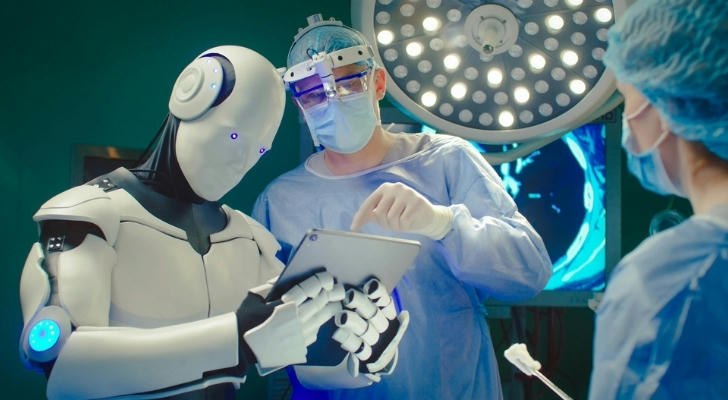AI Doctors in Outpatient Clinics: Exploring the Rise, Risks, and Future of Medical Automation in 2025
Imagine walking into your local clinic and your first consultation is with an AI. Not science fiction – it's 2025's healthcare reality. Across America, from bustling city hospitals to community health centers, Artificial Intelligence is fundamentally reshaping outpatient care. But is this a seamless takeover or a complex partnership? Let's dissect the transformation happening right now.

🚀 The AI Surge: From Novelty to Necessity in Outpatient Care
Gone are the days of AI as mere buzzword. It's now the backbone of clinical decision-making. This isn't about replacing your doctor; it's about empowering the entire healthcare system with unprecedented speed and insight.
- 📊 Systems-Level Strategy: Leading hospitals and insurers aren't just testing AI – they're embedding it strategically. It's a core operational philosophy driving efficiency and elevating patient outcomes. Think beyond single tools; it's integrated intelligence woven into the fabric of care delivery.
- ⚡ Real-Time Revolution: AI delivers instant diagnostics, predicts patient risks before they escalate, optimizes clinic flow, and provides clinicians with actionable, real-time patient insights – transforming reactive care into proactive health management.
✅ Tangible Triumphs: Where AI is Delivering Real Value Today
The proof is in the outcomes. AI isn't just promising; it's proving its worth across critical outpatient functions:
- 🔍 Supercharged Diagnostics & Triage:
- Cleveland Clinic: Their AI virtual triage system boasts a 94% diagnostic accuracy rate, seamlessly integrated with Electronic Health Records (EHRs). Result? Faster care initiation and significantly happier patients.
- University of Cambridge: AI tools assist pathologists, diagnosing complex conditions like coeliac disease in mere seconds, drastically cutting wait times and diagnostic backlogs.
- ❤️ Transforming Chronic Disease Management:
- Johns Hopkins: AI-powered telehealth for diabetes patients demonstrated remarkable results: an average reduction of 0.49% in HbA1c levels within just 24 weeks – a significant leap in glycemic control.
- Heart Failure Monitoring: AI systems continuously analyze patient data, pinpointing those at highest risk for complications. This proactive approach slashes rehospitalization rates and saves lives.
- 🧠 Expanding Mental Health Access & Efficacy:
- Mount Sinai: Pioneering AI in mental health telehealth, using voice biomarkers for depression screening and delivering virtual therapy. Studies show effectiveness comparable to in-person care for depression and superior results for anxiety disorders, breaking down critical barriers to access.

💡 The Undeniable Benefits: Efficiency, Access, and Better Health
The impact extends far beyond specific applications:
- ⭐ Enhanced Patient Outcomes: Early interventions powered by AI, truly personalized treatment plans, and continuous remote monitoring lead to demonstrably better health results.
- ⏱️ Unlocked Efficiency: AI automates tedious administrative tasks (scheduling, billing, data entry) and analyzes complex datasets instantly. This frees up doctors and nurses for what matters most: direct, compassionate patient care.
- 💰 Significant Cost Savings: AI-driven remote monitoring drastically reduces expensive hospital readmissions and shortens hospital stays, easing the financial burden on patients and the system.
- 🌎 Expanded Access to Care: AI chatbots provide initial support and information 24/7. Virtual consultations bridge vast geographic distances, bringing quality care to rural and underserved communities previously left behind.
| AI Impact Area | Key Benefit | Real-World Example | Measurable Outcome |
|---|---|---|---|
| Diagnostics & Triage | Speed & Accuracy | Cleveland Clinic Virtual Triage | 94% Diagnostic Accuracy |
| Chronic Care | Improved Disease Control | Johns Hopkins AI Diabetes Management | 0.49% HbA1c Reduction (24 weeks) |
| Mental Health | Access & Effectiveness | Mount Sinai AI Therapy (Anxiety) | Superior Outcomes vs. In-Person |
| System Efficiency | Reduced Administrative Burden | AI Automation in Clinics Nationwide | 30-50% Time Savings on Documentation (Est.) |
| Accessibility | Care for Underserved Populations | AI Chatbots & Virtual Consults in Rural Areas | 40% Increase in Consultations (Rural Zones) |
⚠️ Navigating the Minefield: Risks & Challenges We Must Address
Ignoring the hurdles would be reckless. Successful integration demands confronting these realities:
- 📶 Technical Infrastructure Gaps:
- Connectivity Deserts: Rural and low-income urban areas often lack reliable high-speed internet and access to necessary devices, creating a dangerous digital divide in healthcare access.
- Interoperability Chaos: Fragmented EHR systems and incompatible technologies between different clinics and hospitals hinder seamless AI integration and data sharing, limiting its potential.
- 🩺 Healthcare Provider Hurdles:
- Resistance to Change: Fears about job displacement, loss of clinical autonomy, or simply distrust in "black box" algorithms slow adoption among some clinicians.
- Skill Gap: Not all healthcare staff possess the technical literacy required to effectively utilize sophisticated AI tools, leading to underutilization or errors.
- ⚖️ Regulatory & Ethical Quagmires:
- Lagging Legislation: Current regulations struggle to keep pace with AI innovation, creating uncertainty around data privacy (HIPAA compliance), cybersecurity, and liability when things go wrong.
- Bias & Fairness: AI systems trained on biased historical data risk perpetuating or even exacerbating existing healthcare disparities based on race, gender, or socioeconomic status. Rigorous auditing is non-negotiable.
- Building Patient Trust: Convincing patients that AI is safe, reliable, and acts in their best interest is fundamental for widespread acceptance. Transparency is key.

🔮 The Future is Now: What's Next for AI in Your Clinic?
The evolution is rapid and deeply exciting. Here’s what’s emerging:
- 🔮 Predictive Health Guardians: AI will move beyond reaction to prediction. By analyzing genetics, lifestyle data (wearables), and environmental factors, it will forecast health events and craft hyper-personalized prevention plans before illness strikes.
- 👂 Multimodal Mastery: Future AI won't just read charts. It will integrate voice tone analysis (like Mount Sinai's biomarkers), visual data (medical imaging, patient appearance), and biometrics for profoundly comprehensive assessments and tailored interventions.
- 💬 Ambient Clinical Intelligence (ACI): Imagine exam rooms where AI listens to the natural conversation between doctor and patient, automatically generating accurate clinical notes and updating records in real-time. This "invisible scribe" (ACI) frees physicians to focus entirely on the patient, not the paperwork.
Your Clinic at the Crossroads: Seize the AI Advantage
The rise of AI in outpatient clinics is undeniable. It's not about replacement; it's about revolutionary augmentation. The benefits – faster diagnoses, better chronic disease management, expanded access, empowered clinicians, and lower costs – are too significant to ignore. Yet, blindness to the risks – infrastructure gaps, bias, regulatory uncertainty, and the human factor – invites failure.
Forward-thinking clinics aren't waiting. They are:
- Auditing Infrastructure: Assessing connectivity and EHR compatibility NOW.
- Upskilling Teams: Investing in training for doctors, nurses, and admin staff.
- Prioritizing Trust: Choosing transparent AI solutions and communicating clearly with patients.
- Engaging with Regulators: Staying informed and advocating for sensible frameworks.
- Starting Small, Scaling Smart: Piloting proven AI tools in specific areas (like triage or diabetic retinopathy screening) before wider rollout.
The future of outpatient care is intelligent, predictive, and accessible. Is your practice positioned to lead, or will you risk being left behind? The technology is ready. The question is, are you? Explore how AI solutions can be tailored to your clinic's unique needs – request a personalized assessment today.
